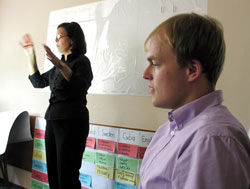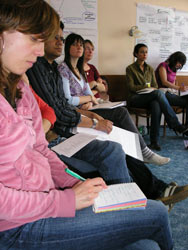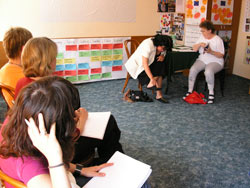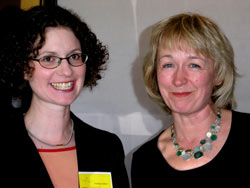Sitemap | Imprint
Teaching Culture!
Events > Project week in Lithuania > Travelogue



Thursday afternoon

In spite of the fact that the session lasted just 30 minutes, I must say that it was a very practical and straightaway session on nonverbal communication. The conductors of the session were Pat and Dot who did their role as trainers incredibly well. The way they handled the session was really much appreciated by the participants.

But finally they find a way of being together and have fun and enjoy despite their opposite preferences.
The aim of the performance was to show the importance and significance of the variety of codes of nonverbal signals when communication is intended to occur. The participants' role as audience (observers) was not passive but an active one due to the fact they had to identify and write down all those nonverbal communication signals of the performance in order to be classified and commented on in a following-up activity.
When the sketch was finished, participants worked in pairs so as to classify those identified signals according to a classification provided by the tutors. Short pair discussions were relevant in order to reflect on the possible deduced meanings of those signals as well as to raise questions on their relevance when communicating with each other. After a while, participants' ideas were discussed and commented on with the rest of the group with the tutors' assistance. The conclusion of the session was based on the importance of nonverbal communication in our daily life activities as well as its important role in order to understand our learning and teaching realities.


two of the participants presenting their institutions to a Lithuanian teacher
Project leader Alexandra Haas together with a Lithuanian teacher
(by Laura Lobet )